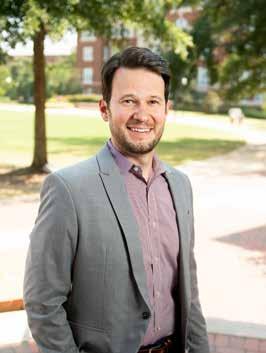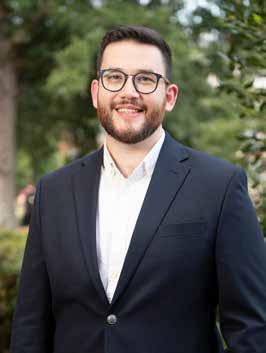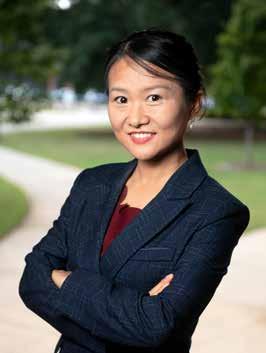
9 minute read
A Degree Beyond
A Degree Beyond
By Kirsten Shaw
Students who choose to pursue degrees at the doctoral level do not do so lightly. Acquiring a PhD is a rigorous challenge requiring significant time and resources. Those who take up the endeavor are motivated by purposes such as love of learning, passion for a given topic, aspiration to teach and desire to challenge and improve knowledge.
The PhD in Business Administration program began at Mississippi State in 1964. Since that time, nearly 400 degrees have been conferred. The program’s graduates have represented MSU at more than 200 universities and organizations in some 15 countries.
The College of Business is proud of its doctoral scholars, who make contributions to their fields through research and the classroom. Here, three of our current PhD students and a recent graduate show why the future is in good hands.

DR. GREGORY J. BOTT, Columbia, MO-- Business Information Systems. BA, Political Science, Washington University in St. Louis, 1989; MSc, Engineering (Software Engineering), University of Texas, 2006; PhD, Information Systems (Cybersecurity), Mississippi State University, 2017. Dissertation Chair: Dr. Merrill Warkentin
Photo by Jaclyn Head
Dr. Greg Bott is an Assistant Professor at the University of Alabama, where his primary teaching and research focus is cybersecurity. He teaches Applied Cybersecurity and Data Acquisition using Python.
Before entering the PhD program, he worked for Microsoft Corporation as a Program Manager dealing with collaboration applications, then served as Chief Technology Officer for INC2inc, Dairy, LLC and Ideal Software Systems. While at Ideal, he also taught information systems courses at MSU-Meridian and discovered a passion for academia that led to the MSU PhD program.
“The professors involved in the doctoral program are deeply committed to preparing their students to be well-equipped to produce high-quality, rigorous research,” Bott shares. “A key aspect is that they are highly productive in the research community. Everyone I graduated with from MSU is doing solid research in information systems and information security.”
Bott’s dissertation focuses on privacy issues in the context of smartphones. “Smartphone users reveal a great deal of personal information on their smartphones, and the traditional explanation is that they do so because of a deliberate evaluation of risk vs. benefit,” he says. “My dissertation challenges that assumption and introduces the idea of privacy resignation as a reason for disclosure of personal information. The ‘real world’ impact of this will hopefully be reflected in policies and regulations that protect the user from unfair data collection.”
As an educator, Bott’s approach employs a variety of instruction methods because he understands students do not all learn in the same manner.
“As much as possible, I incorporate ‘doing,’ hence the ‘applied’ portion of my Applied Cybersecurity course,” he notes. “I was provided multiple opportunities to teach MSU students and to observe my professors teaching their courses. MSU professors have a passion for their students, and that was passed on to me.”
At Alabama, Bott serves on the Master’s and PhD committees. He enjoys doing information security research and also hopes to contribute to the effort to stop human trafficking by participating in research in that area. There is one aspect of his work that he finds the most rewarding, however.
“My students are very important to me,” he states. “One of my goals is to prepare them as much as possible for their futures. I enjoy helping them gain the understanding, concepts and skills necessary to succeed.”
Outside his academic pursuits, Bott is also a certified digital forensic examiner and expert witness.

TYLER HANCOCK, Laurel, MS-- Doctoral student, Marketing. BS, Business Administration, University of Southern Mississippi, 2009; MBA, University of Southern Mississippi, 2010. Dissertation Co-chairs: Dr. Frank Adams and Dr. Michael Breazeale
Photo by Beth Wynn
Tyler Hancock became interested in a doctorate while getting an MBA but wanted to gain business experience first. He worked in sales, in the non-profit sector and in consulting with Deloitte. Then he got the opportunity to teach as a visiting marketing instructor at the University of Southern Mississippi.
“After this experience, I was sure that a doctorate was the right path for me,” he says. “I truly enjoy the classroom setting and getting to help students grow. I also enjoy the benefits of contributing to new ideas and knowledge through research.”
He soon discovered the MSU PhD program in marketing was the right fit. “The faculty members have a tremendous track record for the quality of their publications and also the support they provide to students,” he remarks. “The culture of the department, both with the faculty and other doctoral students, is one of support and collegiality. This drives collaboration on research topics and also builds a closeknit environment. MSU also provides numerous resources through labs, seminars and community activities to support personal and professional development.”
Hancock is now in his fourth year and plans to complete his PhD in May 2020. His research interests are driven by his own experience in managing the expectations of numerous parties, and his findings will be useful to companies aiming to build long-term customer relationships. Typically, his research falls into three categories: monitoring of customer relationships; the complexities added to those relationships by the digital environment and the study of when, how and why customers deviate from the expected parameters of a relationship.
“The doctoral program requires a mastery of the current topics in marketing,” he observes. “This is incredibly helpful for both developing research ideas and transmitting this knowledge in the classroom. The faculty act as mentors to provide support for ongoing growth. Working on a number of projects with both professors and fellow students prepares me for a career as a marketing professor.”
Hancock, MSU’s 2019 Donald Zacharias PhD Graduate Teaching Assistant of the Year, notes that the program has improved his teaching skills, adding techniques for greater student engagement and collaboration in the classroom. Another asset to the program he points to is travel funding to conferences and consortiums where students may present papers, hear from top researchers and network with others in their fields.
As a future marketing professor, Hancock looks forward to researching topics he finds interesting and important. He also plans to collaborate with partners in the business world to develop projects for his students and to gain insights into the day to day issues that can be addressed through research.

CALEB HOUSTON, Laurel, MS-- Doctoral student, Finance. BS, Business Administration, Mississippi College, 2011; MBA with concentration in Finance, Mississippi College, 2014. Dissertation Chair: Dr. Brandon Cline
Photo by Beth Wynn
Finance captured Caleb Houston’s interest from the time of his first undergraduate course. “I enjoyed the mechanics of finance and how the theory and models helped answer questions about optimizing financial decisions,” he says. “I loved learning about the choices managers at a firm make to solve problems and maximize resources. Within finance, you can utilize the same principles for personal investments as well, making it a very useful skill set.”
Now in his fifth and final year toward a PhD, he has completed coursework and is focused on his dissertation and on teaching. He has been inducted into the MSU Graduate Student Hall of Fame and received the College of Business’ 2019 Outstanding Doctoral Student Research Award.
“I am interested in studying individuals, the constraints they face, the choices they make and the subsequent effect those decisions have on firms and financial markets,” he says. “Examining these circumstances translates into research opportunities in diverse areas of corporate finance and investments. Recently, this focus has led to ideas focused on the decisions made by agents of a firm. These actions are important determinants for the future performance of the firm, and questions about these decisions led to the development of my dissertation, which is centered on the market transactions of firm insiders.”
Houston has found his time in the doctoral program to be enriching and challenging. “The coursework and research requirements have pushed me further than I thought I could go,” he comments. “I attribute much of the strength of this doctoral program to the professors in the department, and in my case, especially my advisor, Dr. Brandon Cline. The professors who taught my classes and with whom I have engaged in research have been very knowledgeable and helpful. In addition, both department heads who have led the department during my time in the program have been encouraging and supportive.” Through the doctoral program, the former Xerox business professional has gained teaching experience in traditional, summer and online courses.
“Learning is a process that results in lasting change, and I use methods to nurture this progression that originated through experiences in my own classroom and by observing the teaching methods of other professors,” he says. “I facilitate learning with lectures, questions and real-world examples that stimulate interest and provide exposure to the subject.”
Houston has presented his research at major national and regional conferences. He has begun professional service as a referee for a peer reviewed article in The American Economist and served as discussant or session chair at several conferences. He looks forward to a rewarding career on a university faculty.
“I enjoy being in an environment of learning, both as a researcher and teacher,” he remarks. “Engaging in research provides a challenge and level of flexibility that few careers can match. I [also] thoroughly enjoy the classroom and the challenge of engaging and inspiring students.”

LILI YAO, Hebi, Henan Province, China-- Doctoral student, Economics. Bachelor’s degree, Accounting with minor in Law, Northwest A&F University (China); Master’s degree, Financial Management, Northwest A&F University. Dissertation Chair: Dr. Sandra Orozco-Aleman
Photo by Beth Wynn
Lili Yao is in the fifth year of her doctoral studies and anticipates getting her degree in the summer of 2020. When Yao began the PhD program, she initially struggled with her expectations. A fundamental economic theories class she took during her first semester stands out in her memory.
“I questioned my professor’s teaching method – why we needed to read so many pages on theories and questions already established or solved,” she recalls. “Finally, I realized the necessity of understanding the process of how theories got discovered and how debating between economists helps with the economic theories we learn today. The experience inspires me to keep my curiosity and ask questions. Today, when I look back, I appreciate all the courses I took, every professor I studied under and every staff member who helped me.”
Yao came to MSU for financial reasons and personal ones – at the time, she had a baby girl on the way and needed to be as close as possible to the University of Mississippi, where her husband was a PhD student. Coming from China to the United States was an understandable culture shock. But the resulting observations and experience – coupled with her desire to learn something practical and meaningful – have influenced her research interests. “In every day’s observing, I asked myself, ‘What’s the most supportive thing one needs? A job,’” she says. “So I put my efforts into labor economics. At the same time, I am a foreigner, and new immigration stories and reports interest me a lot. These are the reasons my dissertation is about undocumented immigration flow, economic fluctuation and immigration policies.”
She is also looking at the topic of immigration and institution – the effects that come from differences in culture and beliefs.
Yao, who previously assisted a CFO in a state-owned enterprise in China, anticipates ultimately becoming a full professor on a university faculty.
“I appreciate that our program allows us to teach, which is an excellent opportunity to prepare,” she says. “I have taught five sections of undergraduate level courses – Microeconomics three times and Macroeconomics twice. Class sizes ranged from six to 70 students.”
She notes not only that the experience will provide an advantage when seeking a faculty position but also that it is beneficial in ways that could apply to other jobs as well – presentation skills, organizational skills and the added mastery of subject matter that comes with teaching it to others.
Her passion for her field comes through as she talks about her goal of spreading information.
“You could figure your superpower out by learning and practicing economics!” she proclaims. “You can find your equilibrium no matter what situation you are in.”










